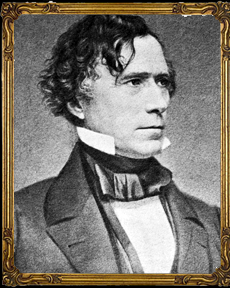
Franklin Pierce
Term Date: 1853-1857
Political Party: Democrat
Vice President: William R. King
Born Place: Hillsborough, New Hampshire
Born Date: November 23, 1804
Died Place: Concord, New Hampshire
Died Date: October 8, 1869,
First Lady: Jane Means Appleton
Children: 3
Parents: General Benjamin Pierce, Ann Kendrick
Other Political Offices:
Speaker of the New Hampshire State Legislature, 1829-1833
U.S. House of Representatives (New Hampshire), 1833-1837
Unites States Senate (New Hampshire), 1837-1842
Occupation before elected:
Lawyer, soldier
Brief History:
As a general in the Mexican War he was with his command for the capture of Mexico City. HE gave his strong support for the Compromise of 1850. One of his friends, Nathaniel Hawthorne, wrote Pierce's campaign biography. After the death of their third child Jane Pierce became a recluse and throughout the administration declined to participate in public appearances. Pierce was also the first president to elect to his cabinet a Catholic, James Campbell of Pennsylvania for postmaster general. Up to that time he was the youngest president elected to office. His policies as president did not do much to calm the union. Another one of his acts was to negotiate a trade and peace treaty with Japan brought on by Commodore Matthew Perry. During his term the United States increased in size due to acquiring land from other countries.
Among his accomplishments was the Gadsen Purchase which gained another 45,535 square miles in the area of New Mexico and southern Arizona. A bill that passed during his term that became law on May 30, 1854, was the Kansas-Nebraska Act by which the U.S. Congress established the territories of Kansas and Nebraska. The Ostend Manifesto in Oct., 1854, instructed Pierre Soulé, minister to Spain to try to buy Cuba from Spain and also suggested to take it by force if Spain refused. Pierce left the White House with little fulfillment of his goals and set out with his wife on a European tour. After also traveling in the United States and the West Indies, he settled in Concord in 1860. He spent his last years in seclusion and died in Concord on October 8, 1869.
Among his accomplishments was the Gadsen Purchase which gained another 45,535 square miles in the area of New Mexico and southern Arizona. A bill that passed during his term that became law on May 30, 1854, was the Kansas-Nebraska Act by which the U.S. Congress established the territories of Kansas and Nebraska. The Ostend Manifesto in Oct., 1854, instructed Pierre Soulé, minister to Spain to try to buy Cuba from Spain and also suggested to take it by force if Spain refused. Pierce left the White House with little fulfillment of his goals and set out with his wife on a European tour. After also traveling in the United States and the West Indies, he settled in Concord in 1860. He spent his last years in seclusion and died in Concord on October 8, 1869.

